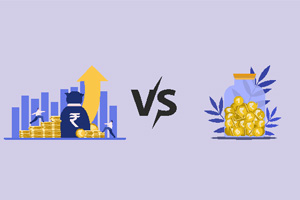A lot of people may not know the full form of LOL, but they still use it when something is funny. The use of abbreviations or acronyms today is more common than ever – even in the investment world. You must have certainly heard about SIP and FD when investments are mentioned. But do you know which is better between SIP vs FD? Let’s find that out after understanding the difference between SIP and FD through this article.
Decoding FDs
FD stands for fixed deposits. An FD is a financial product offered by banks, post offices and Non-Banking Financial Institutions (NBFCs). When you open an FD, you invest a lump sum for a fixed period to earn fixed returns. For example, if you invest Rs 10,000 in 2023 for 5 years at an interest rate of 7%, you will get Rs 14,148 in 2028.
Understanding SIPs
SIP stands for Systematic Investment Plan. Unlike FDs, SIPs are not financial products. Rather, they are a method of investing in a financial product called mutual funds. An SIP allows you to break your lumpsum investment into smaller instalments. When you start an SIP, a fixed sum of money gets deducted from your bank account at fixed intervals and gets credited to your mutual fund scheme’s bank account. For example, if you start a monthly SIP of Rs 5000 in XYZ scheme and choose the SIP date as the 24th, Rs 5000 will automatically get debited from your bank account on the 24th of every month and get invested in your chosen scheme.
Now that we know the basic meaning of an FD and SIP, let’s take a quick glance at the benefits offered by the two.
Benefits offered by FDs
- The primary benefit of FDs is that they are risk-free investments where your returns are guaranteed.
- 5-year FDs can help you save tax on investments up to Rs 1.5 lakh per annum.
- You can take a loan against your FD to meet your needs. However, this can be a double-edged sword since a loan is a liability. Thus, you must carefully plan your finances and avoid resorting to debt.
Benefits offered by SIPs
- SIPs help you become financially disciplined since you save and invest regularly.
- SIPs are light on the pocket. Meeting financial goals becomes easier and less burdensome with SIPs since you spread your investment throughout the year.
- SIPs offer the advantage of rupee cost averaging. You get more units when the market is down and fewer units when the market recovers. This averages out your cost of investment over time.
“SIP or FD, which is better?” Is this question crossing your mind now? Don’t worry! The next segment will solve your dilemma.
SIP vs FD comparison
- Risk: FDs are risk-free investments because the returns are guaranteed. The risk with SIPs will depend on the mutual fund scheme you invest in. Equity funds are high risk-high return investments. On the other hand, debt funds are low risk-low return investments. Hybrid funds combine equity and debt and are, thus, between the two as far as the risks and returns are concerned.
- Investment type: FDs allow one-time investment. SIPs, on the other hand, allow you regular and periodic investments. You can choose your SIP frequency according to your convenience. While monthly SIPs are common, some Asset Management Companies (AMCs) allow daily, weekly and quarterly SIPs too.
- Investment amount: The minimum investment amount for FDs is usually Rs 1000. However, it can vary. You can start an SIP with an amount as low as Rs 100.
- Liquidity: FDs lock your money for a fixed period. You may be able to withdraw your investments prematurely but after being subject to a fee. All in all, FDs offer limited or no liquidity. SIPs in open-ended mutual funds can be redeemed anytime.* The money gets reflected in your account within 1-4 working days depending on the type of the fund.
* ELSS is an exception with a lock-in period of 3 years.
- Investment tenure: The tenure of FD can be as short as 7 days or as long as 10 years. Some entities also offer 20-year FDs. You can invest through SIPs and stay invested for as long as you wish. In fact, the longer you stay invested, the better it is for your wealth since you can gain from the power of compounding.
Conclusion
FDs are investment products, whereas SIPs are a method of investing in an investment product. Is SIP better than FD? Well, there is no direct comparison between the two. But adequate information about each of them will help you make wise investment decisions.
An investor education initiative by Edelweiss Mutual Fund
All Mutual Fund Investors have to go through a one-time KYC process. Investors should deal only with Registered Mutual Fund (RMF). For more info on KYC, RMF and procedure to lodge/redress any complaints, visit - https://www.edelweissmf.com/kyc-norms
MUTUAL FUND INVESTMENTS ARE SUBJECT TO MARKET RISKS. READ ALL SCHEME-RELATED DOCUMENTS CAREFULLY
Trending Articles
MUTUAL FUND INVESTMENTS ARE SUBJECT TO MARKET RISKS, READ ALL SCHEME RELATED DOCUMENTS CAREFULLY.




















